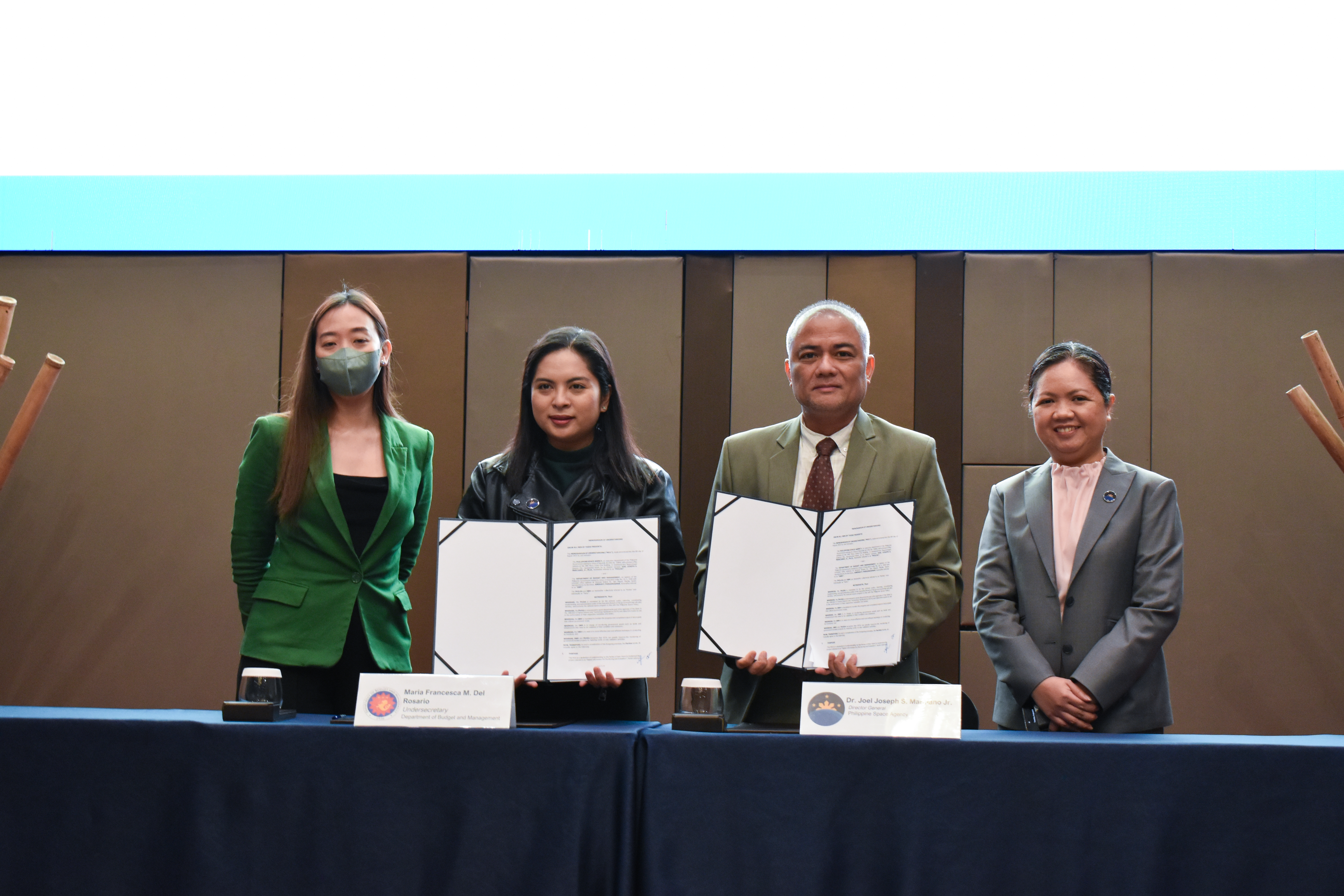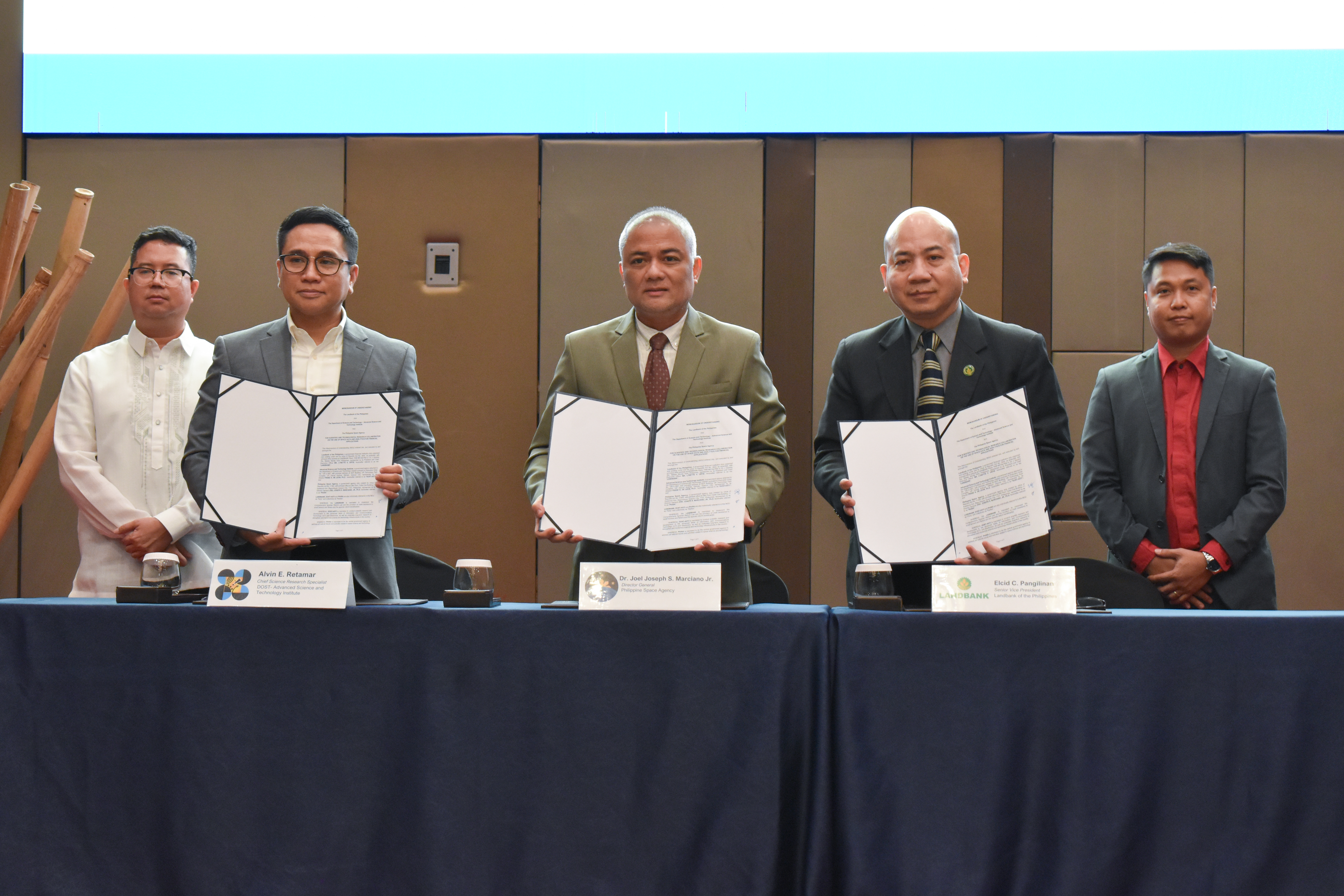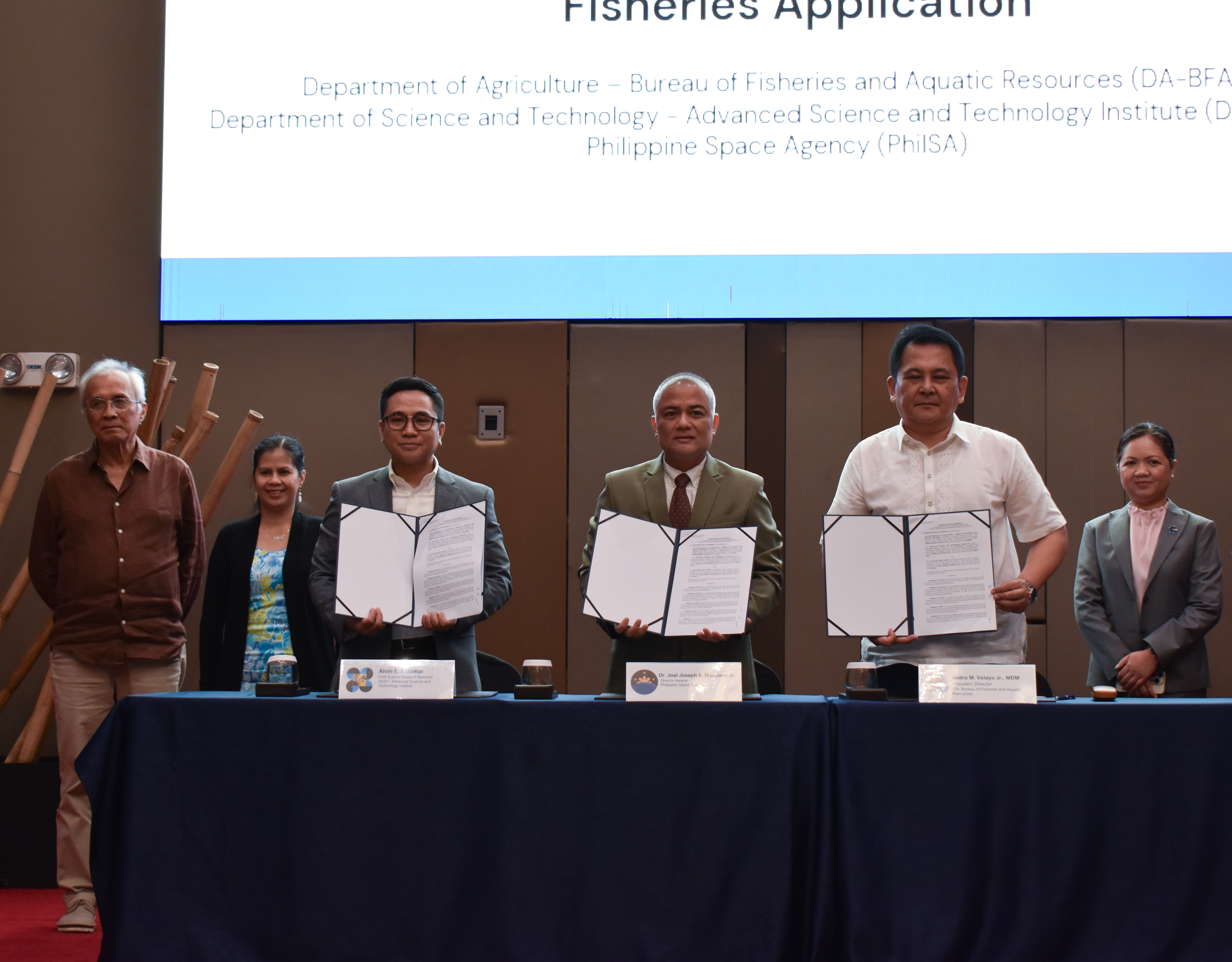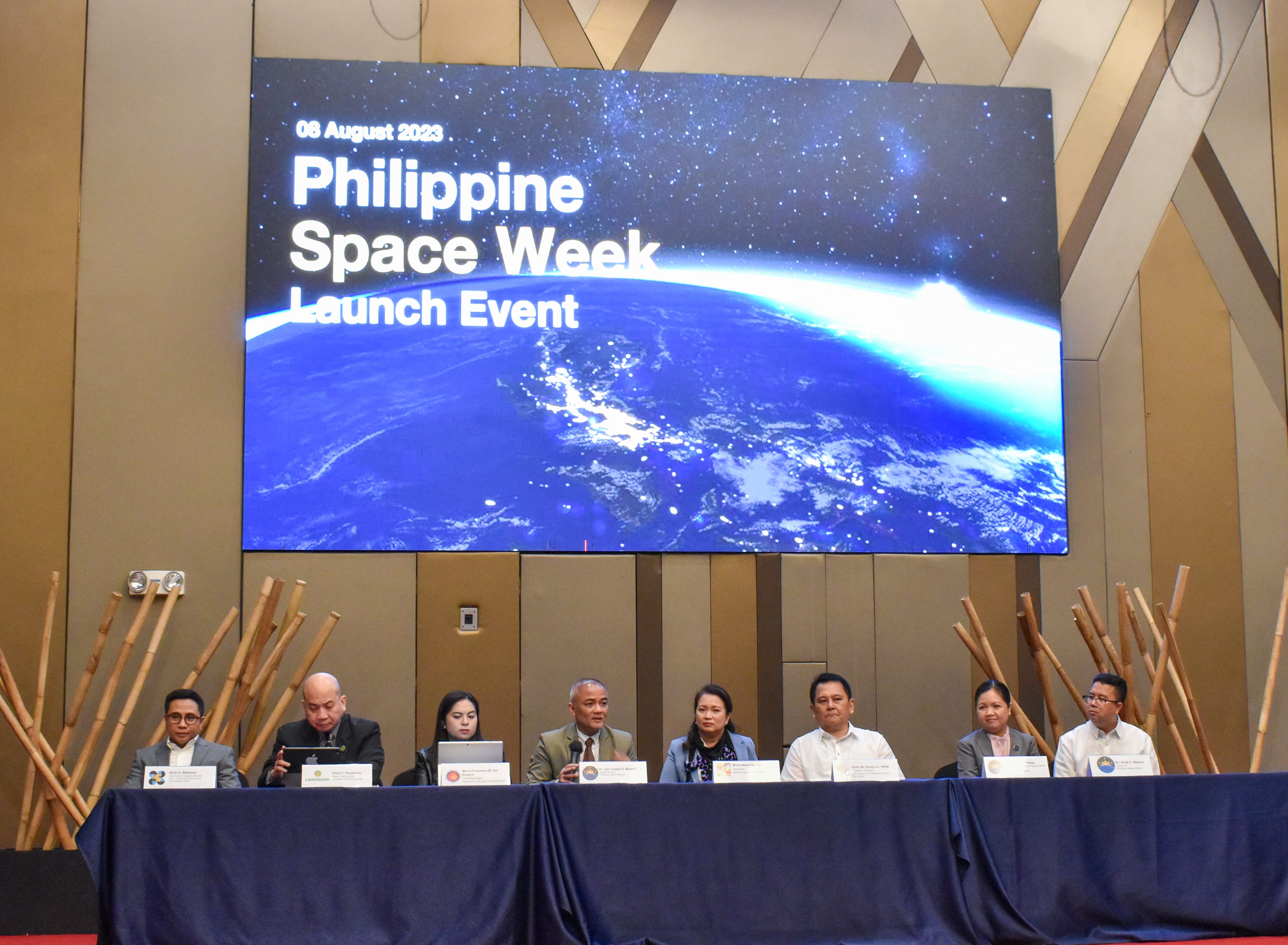The Philippine Space Agency (PhilSA) opens the Philippine Space Week celebrations with the signing of five (5) landmark agreements envisioned to deepen space data acquisition and the use of space science and technology applications for value creation. This vision is in line with PhilSA’s fourth year anniversary theme, Yamang Kalawakan tungo sa Maunlad na Kinabukasan.
PhilSA inked formal agreements with the Department of Budget and Management (DBM), Land Bank of the Philippines (LBP), the Department of Science and Technology-Advanced Science and Technology Institute (DOST-ASTI), Mindanao Development Authority (MinDA), the Department of Agriculture-Bureau of Fisheries and Aquatic Resources (DA-BFAR), and the Korea International Cooperation Agency (KOICA).
Monitoring government-funded projects from space

DBM Undersecretary Maria Francesca del Rosario and PhilSA Director General Dr. Joel Joseph Marciano, Jr. lead the agreement signing on the DIME project
PhilSA and DBM signed a Memorandum of Understanding to implement the “Digital Information for Monitoring and Evaluation,” or DIME project. This initiative is expected to improve the monitoring of government property and government-funded infrastructure projects with the use of data and images from satellites processed and made available by PhilSA. This would reduce costly on-ground efforts such as field-based validation activities and would ensure the proper use and expenditure of public funds.
“We wanted to highlight the importance of what PhilSA can offer to the country and to good governance. What we wanted to fulfill in this project is for the public to use space science and technology for them to know whether the government projects and programs are properly implemented in the areas where they are supposed to be implemented. For example, farm-to-market roads, school buildings, and so on. We can leverage on space science and technology and provide good governance for the public to have this sense of comfort that public funds are being used properly,” Budget Undersecretary Ma. Francesca del Rosario explained.
Space R&D for financial applications

Engr. Alvin Retamar of the Department of Science and Technology-Advanced Science Institute, Senior Vice President Elcid Pangilinan of Land Bank of the Philippines, and Director General Dr. Joel Joseph Marciano, Jr. of the Philippine Space Agency sign the tripartite memorandum of understanding for scientific and technological research collaboration on the use of space data and analytics for financial applications
PhilSA, LBP, and DOST-ASTI signed a Memorandum of Understanding to collaborate in scientific and technological research on the use of space data and analytics for financial applications. Areas of cooperation among the three agencies include: the development and utilization of space-related technologies for financial applications; the conduct of joint research and exchange of information necessary for the research undertaking; organization of training symposia or similar activities; sharing of technological resources, and; other areas that may be mutually identified and agreed upon by the parties.
“I am inspired by the boundless potential that lies ahead of our partnerships. These collaborations not only enhance our individual capabilities but also amplify our collective impact in the society and the communities that we serve. DOST-ASTI commits to supporting this undertaking within the bounds of our mandate, that is, the science and technology infrastructure that we run, which exists to support national initiatives that drive groundbreaking discoveries and further revolutionize the landscape of space science and technology in the Philippines,” DOST-ASTI Chief Science Research Specialist Engr. Alvin Retamar said.
“Through this partnership, we look into enhancing our capabilities to roll out more effective lending strategies for the agriculture sector by leveraging on the latest advancements in geospatial technologies and data analytics tools. This is very much aligned with LandBank’s efforts to intensify our support to the sector by streamlining our processes and providing improved services through innovations,” LandBank Senior Vice President Elcid Pangilinan said.
Space data utilization for Mindanao socio-economic development

MinDA Secretary Belen Acosta and PhilSA Director General Joel Joseph S. Marciano, Jr. sign a collaboration agreement on the use of space assets to promote socio-economic development in Mindanao.
PhilSA formed a partnership with MinDA through a Memorandum of Understanding to work together on research and development projects to accelerate socio-economic development in Mindanao through the use of space data. This collaboration, called PhilSA Integrated Network for Space-enabled Actions towards Sustainability or PINAS Mindanao, aims to highlight the increasing relevance of geospatial data in local government policy-making, planning, and monitoring. PINAS Mindanao seeks to develop projects in different local government units in Mindanao to advance peace and development imperatives, promote best practices in governance, and empower communities towards socio-economic inclusion.
“The Memorandum of Understanding on Sustaining the Development Imperatives of Mindanao through Project Planning and Development Research using Space Data and Information is a product of our commitment to work together in achieving the development goals of the island region […] This mechanism will provide a sustainable means of building expertise and sharing up-to-date space-based information about the country, which is essential for development planning. Such an undertaking can be further strengthened through data and knowledge co-creation with relevant stakeholders. Acquiring and processing space-based information, like satellite image maps, costs money, so it is essential that these assets are maximized and effectively utilized, particularly in Mindanao.
“And now, I am confident that through this cooperation with PhilSA, we will be able to provide even better science-based data as an important resource for our development agenda. More importantly, our Mindanao LGUs are poised to reap the benefits of this upcoming project, and we are looking forward to more of Mindanao’s inclusion in various space-based information and project development initiatives through this MOU,” MinDA Secretary Belen Acosta emphasized.
Use of space science and technology for the fisheries sector

DOST-ASTI Chief Science Research Specialist Engr. Alvin Retamar, PhilSA Director General Joel Joseph Marciano, Jr., and DA-BFAR Assistant Director Isidro Velayo, Jr. lead the agreement signing on the use of space science and technology, remote sensing, and data science applications in support of sustainable fisheries and marine biodiversity conservation.
PhilSA has also signed a Memorandum of Agreement with DA-BFAR and DOST-ASTI, signifying a collaboration on space science and technology, remote sensing, and data science applications for enhancement of fisheries management and application.
Working all together to optimize SSTA, all parties are set to cooperate on the development, application, and use of nighttime satellite images in support of sustainable and resilient fisheries conservation, as well as the protection and management of marine biodiversity.
“The use of cutting-edge technology in advancing the Philippine fisheries sector has always been at the forefront of our priorities. We believe that through responsible and conscientious use of technology, we will be able to achieve greater heights in fisheries management and conservation, DA-BFAR Assistant Director Isidro Velayo, Jr. said.
Tackling air pollution from space

The Record of Discussion between PhilSA and the Korea International Cooperation Agency (KOICA) was signed on 02 August 2023. (L-R: PhilSA Deputy Director General Dr. Gay Jane P. Perez, PhilSA Director General Dr. Joel Joseph Marciano, Jr., KOICA Country Director Mr. Kim Eunsub, KOICA Deputy Country Director Ms. Yoo Jiyoung).
Earlier this month, PhilSA and KOICA signed an agreement to strengthen the Philippines’ capacity to monitor air quality and work on developing plans and policies to address air pollution. The Record of Discussions signed between Philippines and Korea on 02 August, seeks to build the Pan-Asia Partnership for Geospatial Air Pollution Information Project and the Pandora Asia Network (PAPGAPI-PAN) in the country. PAPGAPI-PAN is a technology transfer, data-sharing, capacity-building, and international cooperation initiative on air pollution.
The partnership aims to monitor the condition of air quality in the Philippines using data from the Geostationary Environment Monitoring Spectrometer (GEMS) aboard Korea’s GEO-KOMPSAT-2B Satellite complemented by ground-based remote sensing instruments called Pandora. The agreement allows the Philippines to receive Pandora instruments funded by KOICA, which then grants PhilSA the capability to combine satellite and ground measurements for a comprehensive overview of air quality in the Philippines. The Pandora instruments deployed in the country will be part of the Pandonia Global Network (PGN), which collects Pandora data around the world and provides real-time standardized, calibrated, and verified air quality data.
And the celebration continues…
PhilSA has continued to expand the local space ecosystem with its evolving programs, projects, and capacity-building initiatives. The sharing of resources and exchange of know-how and best practices with its partners proves to be crucial in building and reinforcing the local space community as a diverse, responsive, and participative network that will ensure sustained knowledge and innovation in the Philippine space sector. One way to continuously nurture and grow the local space ecosystem is through meaningful partnerships.
As to capabilities, resources, and infrastructure that the country can leverage in the outer space environment to benefit Philippine society, PhilSA Director General Marciano explained that the theme Yamang Kalawakan tungo sa Maunlad na Kinabukasan underscores the significance of opportunities in the global space economy that the Philippines can take advantage of for progress and prosperity now and into the future.
“The celebration of Philippine Space Week aligns with and supports the Philippine Space Agency vision—that of a nation bridged, uplifted, and empowered through the peaceful uses of outer space. As we celebrate the Philippine Space Week, the very first one, starting today, as is customary, we endow it with a theme: “Yamang Kalawakan tungo sa Maunlad na Kinabukasan.
“We propose Yamang Kalawakan, which literally means “space resources” or “space wealth”, to take on a larger, bigger, more figurative, and more encompassing meaning. We use Yamang Kalawakan to refer to the resources, capabilities, infrastructure, products, services, and outer space as a precious environment, that benefit society. Moreover, this theme also stresses the significance of opportunities in the global space economy that the country can seize for progress and prosperity now and well into the future.
“It reflects the PhilSA mission of value creation–that is, that we will build and sustain a robust space ecosystem that adds and creates value in space for and from Filipinos, and for the world. To guide us and to frame this mission of creating value, we look at value chains for strategy guidance. A crucial part of this chain are the end users. That is, those to whom we push, or, more importantly those who pull on, the space-based capabilities that we strive to build. In sum, without the end users, without the utilization, the socio-economic benefit from space science technology and applications cannot possibly be had,” PhilSA Director General Marciano explained.
Dr. Marciano adds: “The pandemic raged and presented challenges and difficulties, but this did not deter the interim PhilSA team from pursuing the opportunities to build the domestic space ecosystem that will contribute to nation-building. We tried to seize opportunities to highlight the role of space science and technology applications and to bring satellites and space capabilities to bear on national recovery efforts–anticipating how the country and the world will eventually rebound and rise from the downturn, and with space data and high value space industrial capabilities prospectively contributing to robust growth.”
Through Proclamation No. 302, s. 2023, President Ferdinand “Bongbong” Marcos Jr. declared the annual celebration of the Philippine Space Week from 08 to 14 August of every year. This celebration coincides with the enactment of the Philippine Space Act on 08 August 2019.
“The declaration recognizes the vital role that space science, technology, and its applications play in the lives of Filipinos—from satellites and their by-products and services that we have come to expect and rely on, to advancing humankind’s collective scientific knowledge and understanding.
The annual celebration to be led by PhilSA will give importance to the space capabilities and the know-how we strive to build and strengthen in the country, and to the contributions of Filipinos everywhere in space science, technology, innovation, policy and cooperation,” PhilSA Director General Marciano highlighted.
More about PhilSA
Envisioning a Filipino nation bridged, uplifted, and empowered through the peaceful uses of outer space—PhilSA, created under Republic Act No. 11363 or the Philippine Space Act, is the central government agency responsible for addressing all national issues and activities related to outer space. Signed on 08 August 2019, this Act mandates PhilSA to be the primary policy, planning, coordinating, implementing, and administrative entity of the Executive Branch of the government that will plan, develop, and promote the national space program in line with the Philippine Space Policy.
Directly attached to the Office of the President, PhilSA’s function among many others, as the national space agency, includes ensuring space policy and program coordination as well as national policies and priorities alignment. Guided by its six (6) key development areas (National Security & Development, Hazard Management & Climate Studies, Space Research & Development, Space Industry & Capacity Building, Space Education & Awareness, and International Cooperation) for SSTA development, PhilSA, up to this day, moves its mission forward of promoting and sustaining a robust Philippine space ecosystem that adds and creates value in space for and from Filipinos, and for the world.




